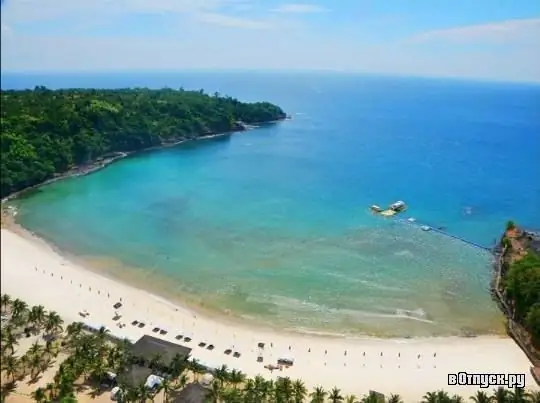
Description of the attraction
The Camaya Coast is a popular beach destination and the name of a small town in Bataan province on the Philippine island of Luzon. It is located 7 km from the Bataan Special Export Zone. In 2010, a major developer, Earth and Shore Leisure Communities Corporation, invested 350 million pesos in the development of a resort area on the Kamai coast.
The name of the coast comes from the Sanskrit word meaning "water breaking against stones" or "the sound of water breaking against stones." And in the Bataan Museum there is evidence that the word "kamaya" can also mean "the place where the mythical tikbalangs - the centaur, flies.
In 1573, about 3 thousand Chinese pirates landed on these shores, who then attempted to conquer Luzon, but lost and were forced to retreat. In 1858 the Spaniards Eduardo Perez and his stepson Francisco Bien bought 200 acres of coastline and named the area "Vine Estate". Bien later bought a stake from his stepfather and turned the beach and the surrounding land into a recreation area and a production site for jerky fish. As the beach grew into a particularly popular destination, Bien tried to restrict access to holidaymakers. But the provincial administration intervened, and in 1908 the Kamay coast was turned into a public beach.
Throughout the 20th century, Kama-Kost was a small workers' settlement. After World War II, American and Japanese veterans who remained in the Philippines settled here. And in the 21st century, immigrants from Germany, Italy and France continue to come here, who do business on the mango trees growing here.
The kilometer-long Kamaya-Kost beach is very popular with tourists throughout the year. Its northern part is rated at 4 points on a 10-point hazard scale, and the southern part - at 6 points due to a strong reverse current near the coast. The southern part is reserved for skimboarding lovers - a type of surfing. During the migration season, dolphins and turtles can be seen in the waters surrounding the beach. In 1985, the beach got into the Guinness Book of Records - the largest photo shoot in the world took place here, in which 825 girls in bikinis took part. In 2008, Kamaya Kost was listed as a National Treasure of the Philippines.
There are many events on the beach every year - the Surfer Festival in August, the Pavican Eco Festival in January, the Aquathlon competition in May, the World Conservation Day in June and the Sand Sculpture Festival in November. There are many cafes and restaurants along the coast, and the hotels offer rooms with wonderful sea views.






